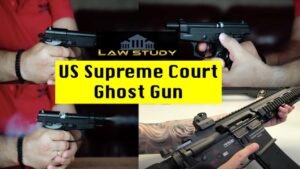US supreme court ghost gun
In July, a Texan court halted the enforcement of a 2022 regulation that mandated self-assembled “ghost gun” kits to bear serial numbers, following a legal challenge from pro-gun rights groups seeking to prevent their classification as firearms. However, the US Supreme Court, in a 5-4 decision on Tuesday, permitted the restrictions to remain intact while the Biden administration appeals the Texas court’s ruling. This decision adds to the pressure on President Joe Biden’s administration to take more substantial action against gun violence.
US Supreme Court restores Biden ‘ghost gun’
The recent Supreme Court ruling ensures that the rule remains effective as the White House contests the Texas court’s decision. The ultimate outcome of this appeal might eventually return to the Supreme Court.
Ghost guns, which can be self-assembled and occasionally 3D printed, lack serial numbers and are challenging to trace. Previously, no background checks were necessary to acquire assembly kits
Last August, the Biden administration introduced new regulations to curb the proliferation of “ghost guns.” These regulations included requiring manufacturers of “buy build shoot” kits to obtain licenses and attach serial numbers to the kits’ frame or receiver. Businesses selling these kits were also required to have federal licenses.
Nonetheless, the Texas District Judge Reed O’Connor argued that the Biden administration exceeded its authority as defined by the 1968 Gun Control Act when categorizing “buy build shoot” kits as firearms.
The White House asserts the need for prompt action against unregistered firearms, noting a significant increase in suspected ghost guns found during criminal investigations in 2021 compared to five years prior.
The United States holds more firearms per capita than any other country globally, with a larger number of guns in civilian possession than there are US citizens.
In 2021, over 48,800 Americans succumbed to gun-related injuries, as reported by the US Centers for Disease Control and Prevention.
Recent Supreme Court judgments have generally expanded individual gun rights. In the previous year, the Supreme Court affirmed that the US Constitution safeguards an individual’s right to carry a handgun in public for self-defense.
In the upcoming session starting in October, the court will address whether individuals subject to domestic violence restraining orders should be allowed to retain their firearms.
Deep-seated divisions within Congress regarding gun control have compelled President Biden and Democrats to pursue avenues beyond passing federal laws to reinforce gun restrictions. These methods involve executive actions by the administration, like the ghost gun regulations, as well as legislation passed at the state and local levels, often in areas where Democratic Party lawmakers hold sway.

Some key points
Ongoing Legal Battle and Complexity
The legal dispute over “ghost gun” kit regulations illustrates the intricate and contentious nature of gun control in the US.
The initial Texas court decision to halt the rule requiring serial numbers showcases the challenges in achieving consensus on firearms-related policies.
Supreme Court’s Role
The recent US Supreme Court decision to uphold restrictions during the appeal process highlights the court’s evolving role in shaping gun rights.
Recent rulings have generally favored expanding individual firearm rights, adding complexity to the gun control debate.
Biden Administration’s Efforts
The Biden administration’s push for stricter regulations on “ghost guns” demonstrates the urgency to address the issue of untraceable firearms.
The administration’s aim to tackle gun violence reflects broader societal concerns about public safety.
Interpretation of Laws and Constitutional Rights
The Texas court’s ruling emphasizes the challenges of interpreting existing laws and balancing constitutional rights in the context of firearms.
Impact of High Gun Ownership and Gun Violence
The high number of firearms per capita in the US highlights the significance of finding effective solutions to curb gun violence.
The substantial toll of gun-related injuries and deaths underscores the urgency for action.
Congressional Divisions and Alternative Avenues
Divisions within Congress over gun control have led the Biden administration and Democrats to explore alternative means of strengthening gun restrictions.
This approach includes executive actions and state-level legislation, showcasing the multifaceted strategy needed to navigate the issue.
Future Implications and Solutions
The ongoing legal battles and policy decisions will continue to shape gun regulations in the US.
As different viewpoints collide, finding solutions that balance Second Amendment rights and public safety remains a complex yet vital pursuit.
Conclusion
The ongoing legal proceedings, the role of the Supreme Court, the Biden administration’s efforts, and the broader context of high gun ownership and gun violence all contribute to the complexity of the gun control discussion. The division within Congress has prompted alternative approaches to address the issue. The future holds further developments in the ongoing quest for effective and widely acceptable solutions to the multifaceted challenge of gun control in the United States.
Frequently asked questions
What is a ghost gun in the USA?
A privately made firearm (also referred to as a ghost gun, or homemade firearm) is a legal term for a firearm produced by a private individual, as opposed to a corporate or government entity.
Is it legal to own a ghost gun in the US?
The building blocks (the gun’s frame and receivers) must have serial numbers, and purchasers must pass a thorough background check before purchasing these parts. Records of sale must also be kept by sellers. These regulations did not make ghost guns illegal.
Are ghost guns legal in Texas?
Last updated January 5, 2023. Texas has no law restricting untraceable firearms, also known as “ghost guns,” or undetectable firearms.

























